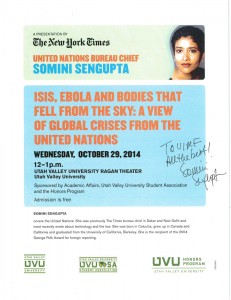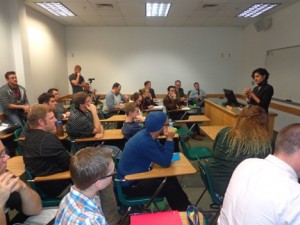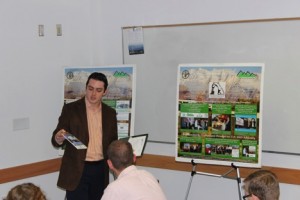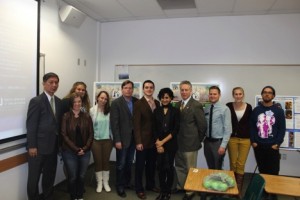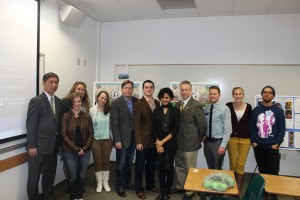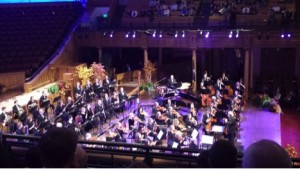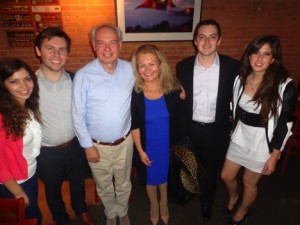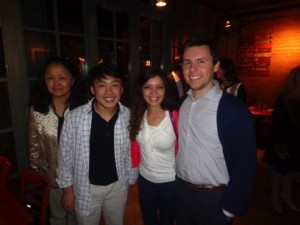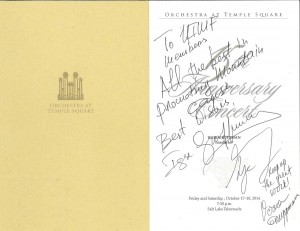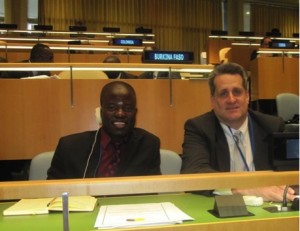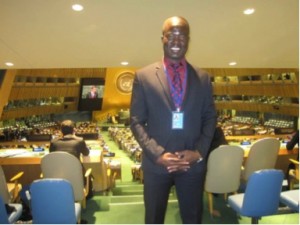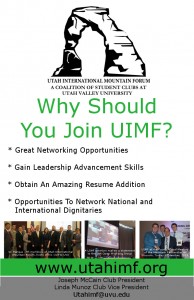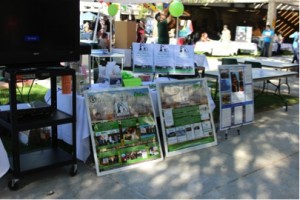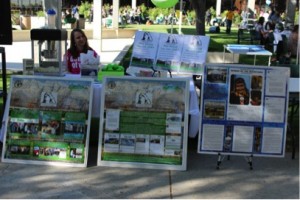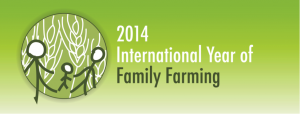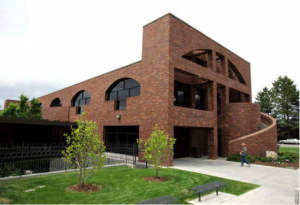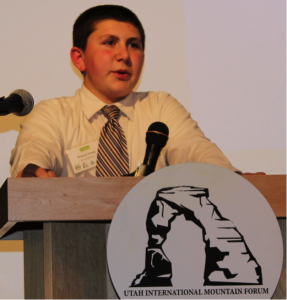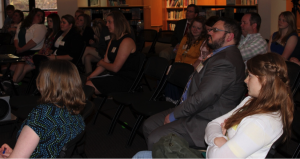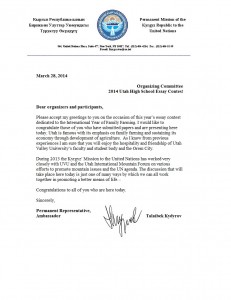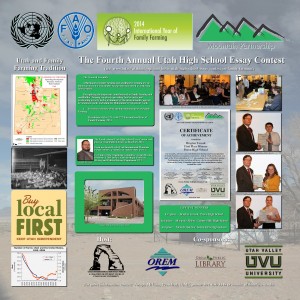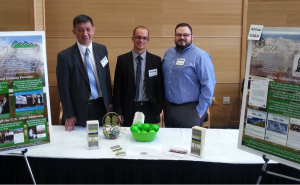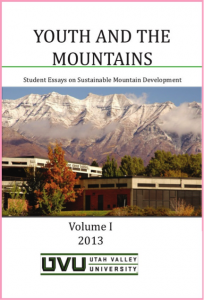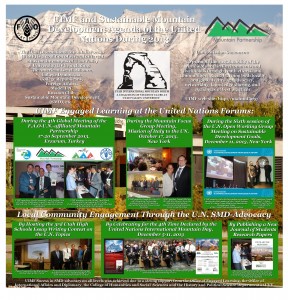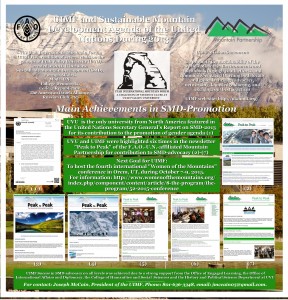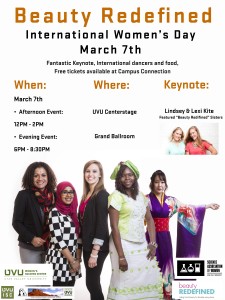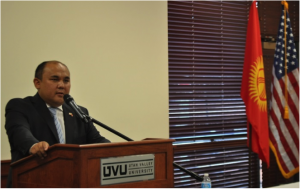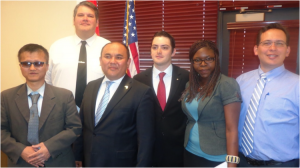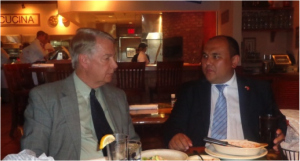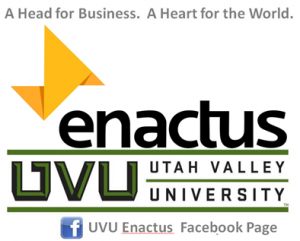New York Times Chief Bureau Somini Sengupta’s UVU Visit
On October 29th, The New York Times’ Somini Sengupta paid a visit to students at Utah Valley University. During her major presentation at Ragan Theater at UVU at noon she spent most of her time answering the group’s many questions, and as a NYT United Nations correspondent, Sengupta was able to provide valuable insight into many of the pressing issues facing the global community.
The main focus of the discussion was centered on current Middle-Eastern crises such as the rise of the Islamic State in Iraq and Syria, the Iranian nuclear program, the Syrian Civil war, and Sunni-Shiite relations. At one point a student asked if there was concern amongst the UN community about the spread of ISIS influence. Sengupta responded by bringing up the startling fact that a recent UN study found that ISIS has recruited fighters from at least 80 countries. She went on to address the concerns of diplomats from Pakistan, India, and numerous South East Asian countries about the threat of Islamic State activities within their nation’s borders.
Ms. Sengupta not only discussed the issues it faces, but also the United Nations itself. While covering the institution, she has grown to appreciate its size and scope—at one point referring to it as a “massive creature with many tentacles”. As someone who has to cover the UN as a whole, it is impossible to be an expert on all areas of the world, therefore, Ms. Sengupta is reliant on experts to help clarify situations involving nations she is less familiar with. In a field as dependent on accuracy as journalism, it is important that one asks themself: “why is he/she telling me this?” As Ms. Sengupta says: “even think tanks or other sources that are supposed to be neutral can have biases”.
While listening to Ms. Sengupta speak, not only the difficulties of her profession became apparent, but also the rewards. It was easy to tell that she loves what she does and derives true satisfaction from it, her only complaint about covering the UN being: “the cafeteria”.
Somini Sengupta during presentation
When Somini Sengupta arrived for a meeting with students at the class on International Relations in the Middle East at 3:00PM, room was full of students and professors that were anxious and eager to hear her speak. In comparison with a gathering for Mrs. Sengupta earlier in the Ragan Theater, this one had a more informal air.
Sure enough, she opened her comments by inviting questions from the students, many of whom had attended her previous lecture. Some of the questions were very interesting. In response to some questions, she talked about her life as a reporter covering the United Nations. The United Nations complex in New York City has a press wing where she stays. She spends a lot of time running after dignitaries to ask questions about particular issues they may have discussed during the day, getting up to date information for her stories at the source. She also discussed her methods for finding alternative sources. There are usually three or four experts in a given area that she will contact when she needs things explained, and she uses quotes from those interviews sometimes in her reports. She also asks her colleagues in-house who may be working in a particular region, such as in Israel for instance, on those kinds of topics for information on the ground where the events discussed in the United Nations are taking place.
Her task is further complicated because there is no United Nations directory board showing which discussions are to be held where, where meetings may be, or anything like that. But, she mentioned, when they have meetings she doesn’t necessarily have to hear from one particular person what was said and decided in the room, because there were usually a small group of dignitaries present. In this way, she can often get good information by talking to several people who were in attendance, which turns out just as well.
Many of the students who attended the lecture, as we noted, were not members of the class, and the camera presence certainly wasn’t usual. We saw in the audience also Dr. Rusty Butler, Associate VP for International Affairs and Diplomacy at UVU, who as well established tradition takes two students every year to visit the U.N. Some of the students in the audience shared with us several interesting and important experiences which took place during his program.
Jesler Molina, UIMF President Presents to Somini Sengupta documents about UIMF involvement in SMD-promotion
After Sengupta’s comments, some of the students stood up and explained several examples of the involvement they have had in the United Nations here at UVU. There were several posters explaining the Sustainable Mountain Development (SMD) program at UVU, and major achievements in that area since 2006 when UVU joined United Nations SMD program. Here at UVU, we support a program for sustainable development in mountainous regions throughout the world, furthering an objective of the United Nations and promoting goals related to that agenda internationally. Many members of the Utah International Mountain Forum (UIMF), a coalition of student clubs at UVU were in attendance, including Jesler Molina, the UIMF’s president. He did a short presentation at the end of class, explaining why it is important to promote sustainable way of life for mountain communities, the students’ involvement in the UIMF, the purpose of the coalition, and the prospects for the future of our program, including plans to continue expanding its influence and potential.
Somini Sengupta with UVU students and faculty after Q&A session
The UIMF’s vice president, Linda Munoz, who is in charge of implementing one of their initiatives, hosting the fourth international Women of the Mountains under the United Nations next fall, also stood up and explained major goals and priorities for the conference. The conference will include scholars and dignitaries from all over the world, intending to promote the United Nations agenda to support sustainable mountain development for women in particular. Sengupta was formally extended an invitation to attend. She replied by promising to check her calendar and see if she would be free.
James Nielsen and Justin Wall, UVU Students With Political Science Major
Group Photo with Somini Sengupta
UVU Students thoughts about Somini Sengupta’s visit to UVU.
NEW YORK TIMES PRESENTATION- SOMINI SENGUPTA
In her discussion of the UN and the events that the intergovernmental organization is currently attempting to tackle, Somini Sengupta quotes the French Ambassador to the UN as doing the following: “The UN is in charge of crises that matter to no one.” On this note, this essay will briefly discuss the comments made by Ms. Sengupta on October 29 at Utah Valley University.
Sengupta opened her presentation for the general student body by describing the civil war in Liberia and the failure of the international community’s efforts to rebuild the war-torn country. She argues that because the international community failed to help Liberia build a stable infrastructure following the war, the country was unable and unprepared to handle a mass epidemic, Ebola, in the region. She argues, perhaps rightfully so, that if healthcare institutions been properly established, the situation in Western Africa may not be so dire.
Following her discussion about Ebola, Sengupta briefly described the organization of the United Nations. She paid particular attention to the 15-member Security Council and its five superpower-veto holders which includes USA, China, Russia, the UK, and France. She told the audience of the difficulty of the council to accomplish anything of great significance because if any of the five powers disagree with a resolution, the resolution will immediately die. Thus, the French ambassador told her “The UN is in charge of crises that matter to no one.” This has resulted in most of the resolutions of the Security Council having a focus in Africa, where the five countries with veto power have relatively few interests.
To further illustrate the concept of the difficulty of creating a contentious in the Security Council, Sengupta points to several current affairs that the organization is failing to control. She mentions Ebola, Syria, and “bodies falling from the sky” in Eastern Ukraine following rebels destroying a Malaysian airlines flight. In contrast, Sengupta described the agreements that the great powers have on fighting ISIS in Syria. Because ISIS poses a threat to all five of the great powers, they have an interest in fighting the organization. The current problem, however, is the Security Council’s inability to gain support for counterterrorist measures by the countries in the region. There are several cases of countries in the region refusing to engage themselves in the fight against ISIS without certain preconditions, which often conflict with each other. For example, Iran and Turkey both have demands that cannot both be met. If the Security Council cannot gain support from all of the countries in the region, then long lasting peace in the region following the ISIS crisis may be unobtainable.
To conclude her presentation, Sengupta poses the following question to the university students: “Should we live in fear?” Her answer was that we should not live in fear. She argues this for two reasons: (1) fear is no way to live a fulfilling life, especially in the USA, and (2) although today may seem chaotic and dangerous, this may be the most peaceful era in human history. To argue her second point, Sengupta points to research done by her colleagues that has found that there are relatively few wars today compared with history. Additionally, she noted that the wars that are currently plaguing our world today are civil wars. Although civil wars take the lives of many, which is devastating, they take fewer lives than international wars.
Overall, Sengupta was a very informative presenter. She presented her ideas with great clarity and conciseness. She clearly has a great understanding of the events that surround international relations today and she will make many great contributions to the world.
Willy Sheehan, UVU Student
UVU Hosts New York Times Chief Bureau
On October 29, the New York Times United Nations Bureau Chief Somini Sengupta came to visit and present at Utah Valley University. Her speech, “ISIS, Ebola, and Bodies that Fell From the Sky: a View of Global Crisis from the United Nations” gave insight to reporters within the United Nations, and the unique perspective that Sengupta has in her position. That afternoon, after her presentation, Sengupta was kind enough to offer a Q&A session for a group of students and professors.
Sengupta explained her unique position; as a writer for the United Nations, she does not have the luxury of being able to focus on a single topic, issue, or even country. Her projects range from the relevant to the explicit, from “ISIS to Ebola”, from India where she was born to Canada where she was raised. She must have an expert understanding on economics, history, politics, and culture to write well. To cover such a wide variety of topics, a large amount of research is necessary. She explained her research methods, and the many resources she needs to pull from, including scholars and specialists on certain topics. Sengupta feels responsible to her readers—those that want truth, honesty, and quality content in the pieces they read. By contacting previous sources, making connections, and being able to internalize a large amount of information in quick, fifteen-minute phones calls with experts, she is able to commit herself to accurate and knowledgeable articles that are needed for their insight to world events and the deliberations of the United Nations.
The UN Bureau Chief was incredibly well rounded and animated, talking about ISIS and its future, Islam in the Middle East, and posing some queries that she might ask a representative from Saudi Arabia, who will be visiting UVU next semester. Discussion ranged from the culture of Saudi Arabia and its questionable intentions and affiliations with terrorist groups like ISIS to the quality of the meals at the UN cafeteria.
Meeting her was an excellent opportunity for UVU students to gain insight to the United Nations, the research of a New York Times reporter, and to discuss world politics and affairs with someone who has the daily opportunity to witness such events first hand.
Hailey Young, UVU student Majoring in Political Science
Notes on The Visit of Somini Sengupta
Last week our International Relations of the Middle East class had the distinguished pleasure of having New York Times writer Somini Sengupta, who cover the United Nations. Our class frequently uses the New York Times to do research for the country case studies we are assigned to do. Many would agree that the New York Times offers us as students a way to stay current without the pollution of a predominant political bias. Mrs. Sengupta was exactly as the company she works for educated, polite, articulated and extremely well informed. She truly embodies what the New York Times stands for.
During Mrs. Sengupta’s visit students were given the opportunity to ask her all sorts of questions. Through our questions we were able to get insight and a new perspective on current issues. Also, perhaps, a greater privilege was that we had the opportunity to ask her about her job and what it involves. Some students even asked her about how she gets her information on the several topics she covers.
Nowadays the New York Time, like most newspapers, can be found online. However accessing the New York Times online something requires a paid subscription. To help its students UVU offers free physical copies of the NYT daily. Thanks to the accessibility of the New York Times students are able to use it as a resource. Of course, when you’re assigned a certain country you’re often reading the articles of the same reporters. Being able to meet one of the New York Times authors allowed us as students to make the connection between the writer and the person.
Personally, I can say that I strongly believe that we might have never had this opportunity if it wasn’t for the structure of engaged learning through the New York Times that our UVU professor Baktybek Abdrisaev has developed. As Political Science students many of us which to someday have our academic knowledge recognized by a legitimate source such as the New York Times. For such students Mrs. Sengupta offers a tremendous source of experience and motivation. Additionally, having her visit our classroom offered the unique opportunity to observe first had the behavior of a professional journalist.
In conclusion, it was an absolute honor to have Mrs. Sengupta in our classroom. As a women in the field I aspire to be like her, which is the reason I invited her to our conference next October, The Women of The Mountain Conference; which, is a conference that promotes the sustainable development agenda of the United Nations. The amazing thing in all this is how through the study of international relations we are able to connect which all sort of scholars, academics and dignitaries. Mrs. Sengupta is one of the people influencing IR today through her articles and it was a great pleasure to be able to interact with her in a classroom environment.
Linda A. Munoz, Vice-President of UIMF
Thanks for organizing this.
I spent most the day at UVU just so I could make sure and be to Somini Sengupta presentation, also when she attended your middle eastern relations class. First off I was very impressed by her professionalism, and the poise at which she held herself. The presentation she gave was very enlightening, entertaining, (not as if that would be a surprise, because of the amazing job she does and her skills as a writer) and simple to follow.
I really enjoyed her comments about the problems that are facing the UN today, and how if the big 5 (USA France, UK, China and Russia) were not interested in what was being brought up, then nothing really ever happened. Which again makes me wonder the effectiveness of the UN. However on the Upside, she did talk about all the little ways the the UN really does make a difference in the lives of the people around the world due to the ability of the little countries to band together in order to form a larger international power.
During the Class we talked mostly about the UN and what was mentioned above. However another comment that really made me enjoy the day was when she commented on the Boko Haram, and who ISIS may be dominating the news, however there are many more terrorist cells and threats that we cannot forget still exist and still pose a viable threat to the lives of people around the world.
Also I guess that if I ever go to the UN in NYC, I should avoid the cafeteria. haha!
Thanks for organizing this. This really was enjoyable and opened my eyes to be a little more open and less strict on how I view the UN as a whole.
Corwin Bowles, UVU student
Eye Opening Presentation of Somini Sengupta
Attending the presentation given by Somini Sengupta was an absolute pleasure. As New York Times Bureau chief for the United Nations she is in the thick of international politics all the time and hearing her speak to that experience and the methods used in informing the readers of the Times was an enlightening experience. I was able to attend a session she held in a classroom setting. Rather than giving a formal presentation, she opened the floor to attendees to give the best responses.
One of the main focuses of the session was how she does her work within the United Nations, and the challenges that can pose to a journalist. In her words “If I was only using official releases I should be fired.” Clearly, reporting at the United Nations is more than just compiling press releases. She detailed some of the processes she goes through to vet sources for articles, and the challenges posed by having to cover such a wide variety of places, namely, that there are more stories than she has time for, more places than one person can have expertise in, and more happening than they can sit in on. To address those issues, the Times calls upon a wide variety of experts from across various disciplines, and with the wide range of place that the times is able to have embedded reporters, they often are able to help corroborate stories with details on the ground, or know an expert locally. This network is invaluable to her and allows the Times to accurately cover stories where one person may not have all the answers. This is especially a benefit in the newsroom where the top story of today is old news a week from now, there is often not enough time in the day to really gain all the knowledge necessary, and she described the process as somewhat like a 15 minute crash course on all that was necessary to cover the story properly.
One of the other main focuses of her talk was on ISIS and the role it plays in the Middle East and its meteoric rise to prominence on the international relations front. Speaking on the developments in Syria and Iraq, Sengupta was informative and explored the issue and the frustrations surrounding it that she sees working at the United Nations. She mentioned the level of international draw that the organization in its recruitment as well as the actions that counties have taken in response to them, specifically calling out the declaration by Saudi Arabia against the group and noting that such action by the king was notable.
The discussion was also brought around to some of the frustrations of the United Nations organization, one of which was the Security Council and the veto power that is held by the major powers, and the degree to which one veto can derail conversation and action on what are international issues. But when asked what the one thing she would most like to change about the UN was she was lighthearted and answered that the one thing that really needs change is the cafeteria.
In all, the presentation by Somini Sengupta was both highly informative and highly entertaining and it was a pleasure and an honor to be able to see such an esteemed guest visit UVU.
Ian Ritchie, UVU student
UVU Hosts Somini Sengupta from the New York Times
Somini Sengupta was born in Calcutta and then has lived in Canada and California, graduating at the University of California, Berkley. She is a New York Times correspondant and bureau chief to the United Nations. On October 29, 2014 at noon she addressed students and faculty at Utah Valley University as part of the Times’ readership program which allows UVU students to have access to current events through complimentary copies of the New York Times. Somini Senguptas topic was titles “ISIS, Ebola and Bodies That Fell From the Sky: A View of Global Crises From the United Nations.”
Ms. Sengputa began by telling a story of Liberia and how Ebola hit a war and poverty stricken country. Soon Ebola spread because of a lack of preparation. No one in the world was prepared for this violent hit, therefore it was no longer just Liberia’s problem, but the world’s as well. This introduction provided a good base for her to show that issues within the world are the whole world’s problem from Ebola to ISIS.
The world’s problems truly are all of our problems, especially the UN’s problems. The UN Bureau chief then briefly spoke about the UN and the role it plays within the world today. She personably interacted with the audience as she quizzed them on different facts of the UN. Although the UN is known as “the world’s conscience”, it truly is an ensemble of countries with their own interests and therefore truly have very little control.
She then went on to tell of specific current events around the world that we are all facing, and further showed how the UN really has little power to affect them. The Syria War showing dysfunction within the Security Council and a product of no real peace talks. From her topic the “bodies that fell from the sky” is referring to when the Malaysian Airline crashed in Ukraine. This story was told from what a townsperson from Ukraine saw which shows how inexplicable and extreme the issues are becoming. She spoke about how it reflects of the Ukraine vs. Russia vs. United States. This shows that there is very little clarity about the enemies and issues facing the world, which just lead Ms. Sengupta into the popular current event of the ever-growing Islamic State in Syria, or ISIS. Who is the enemy? Within this crisis as there are over 80 countries that recruits have come from. The sheer ever growing number of their recruits shows that ISIS is globally everyone’s problem.
Somini Sengupta pointed out that there is very little clarity within the world right now with diseases, insurrections, and even climate change. Then she posed a thought provoking question. We may have all these issues, but what is it compared to the past? Is it really that much worse? She offers the solution that maybe, just maybe the future is something less to fear when compared to the past.
It was very interesting and enjoyable to listen to the eloquent Somini Sengupta talk about the different issues throughout the world. She is reporting directly about each of them and has done so much research and has been able to observe directly for years. She had such a basis of knowledge and background that no matter what question was asked her, or what topic was brought up she could easily and knowledgably speak about any issue.
Kami Winward, member of the UIMF
Local media about Somini Sengupta’s Presentations at UVU:
